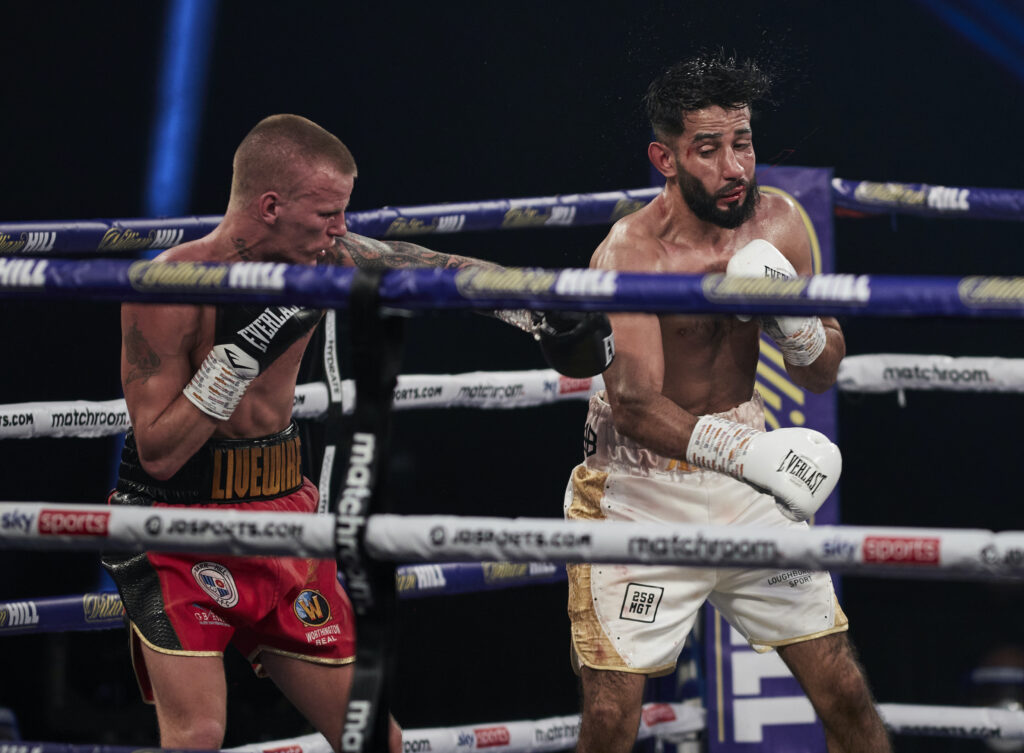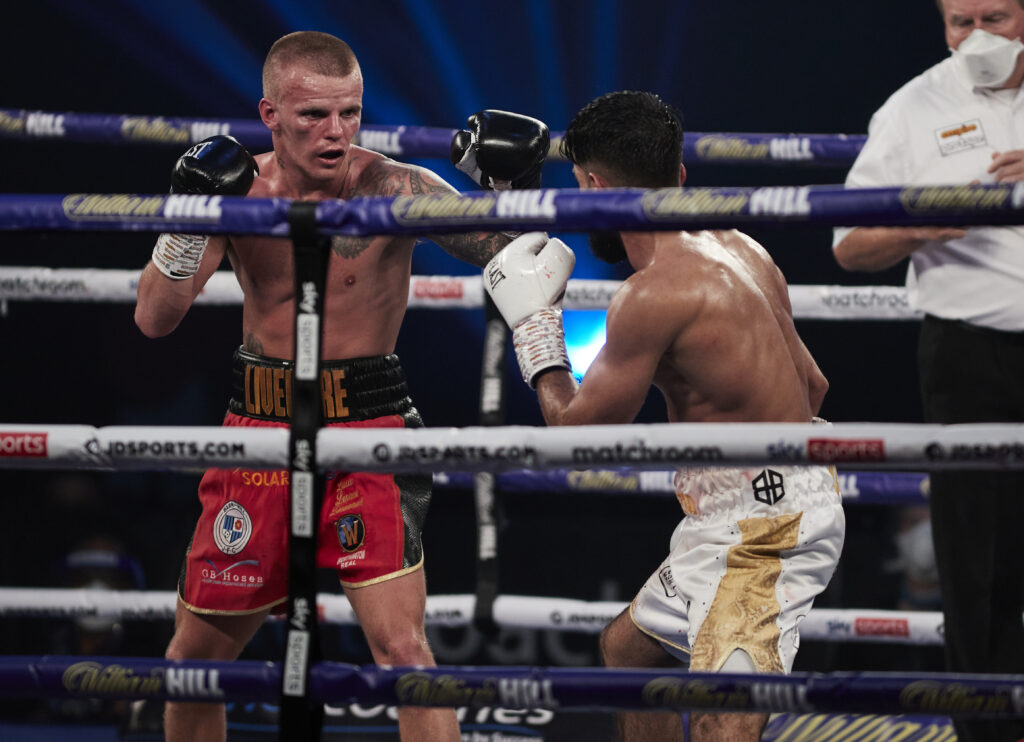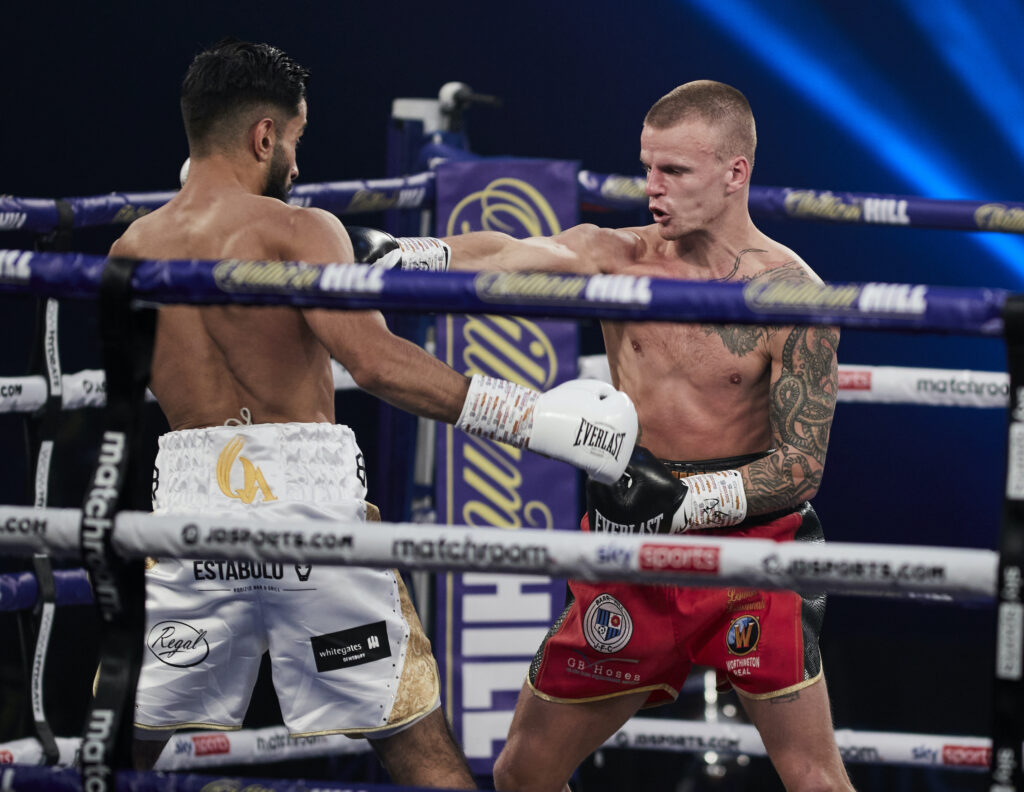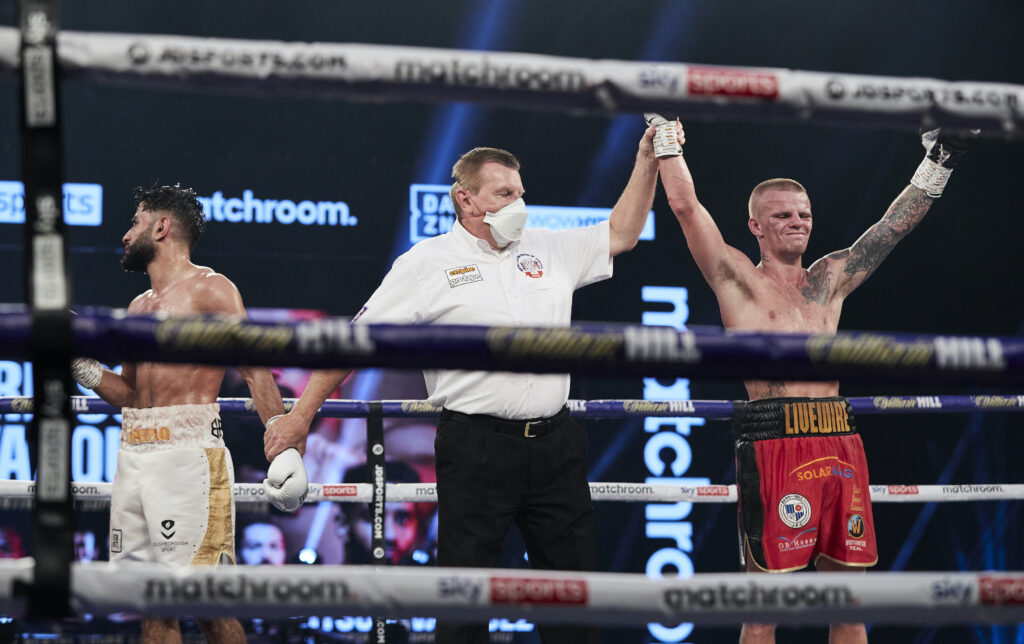“I’ve not seen it yet, but people have told me Tony Bellew was writing me off before I even got into the ring. I heard he was saying [Qais Ashfaq] was going to turn me over,” Marc Leach says with a smile.
He tells Boxing Social that a couple of mates have since sent him the video of ‘Bomber’ calling it spectacularly wrong. Leach says he might watch it later, but it is a safe bet that he probably never will.
The super-bantamweight is an old-school type of fighter. He doesn’t go in for histrionics or motor mouth hyperbole. Instead, he admits to being “just a local lad from Salford”. One whose focus is on his family – his partner and four young children – and the sport of boxing. He has devoted his energy to it from just six-years-old and sees it as a means of providing them all with a better outcome.
The tale is a familiar one though it may lack the noir edges of Isaac Chamberlain’s story that has repeatedly done the rounds of the national press of late. Leach is one of many, without a back story or gold-plated connections, fighting for scraps of airtime largely beyond the prism of television shows. It’s a world without money where winning doesn’t bring prosperity and opportunity, despite success in the ring, can prove stubbornly elusive.
“It’s really tough,” he muses. “If you can’t sell tickets then you’re not in the limelight. Everyone thinks its sunshine and roses, but I’ve fought for free; the money’s not there unless you’ve got a big following or made a name for yourself in the amateurs.”
When Leach met old friend and former sparring partner Qais Ashfaq in a British super-bantamweight title eliminator live on Sky television last month, these two worlds were given an opportunity to collide.
It pitted a former Olympian and Commonwealth Games silver medallist, with a promotional deal with Matchroom, up against an unfancied and largely unknown 26-year-old warehouse worker. “Everyone knows Qais. He’s around the scene and has the big sponsors and the best gear. I don’t think outside of my friends and family in Salford that anyone knew who I was,” he says.

Photo: Mark Robinson/Matchroom Boxing.
But on the night Leach rewarded the support of the folks back at home by making a mockery of his pre-fight odds of 6/1 and comfortably roughing up his previously unbeaten opponent; dropping him twice over the course of the 10-round distance.
In interviews before the fight, Leach had said that he expected it to be a tough night’s work, but now reflects that “It was easier than I thought.” He is unconcerned by Ashfaq’s later protestations on how he wasn’t himself on the night. “It wasn’t him in the ring because I wouldn’t let him be himself,” says Leach. “I put him out of his comfort zone because he’s not used to fighting people of my calibre. I took everything away from him, so that’s why he didn’t feel himself.
“I just took over on the night. I think he underestimated my power because I had moved up a weight. But I felt strong. It was the first fight where I’ve been the underdog and all the hype was around him. I enjoyed that really because I had nothing to lose and loads to gain. I performed to the best of my ability and really showed what I can do.”

Photo: Mark Robinson/Matchroom Boxing.
In the days since his victory, Ashfaq and his team have publicly called for a rematch. However, Leach gives short shrift to such notions that he is all too aware would not be reciprocated should the roles have been reversed. “To me, there is absolutely no point. None at all,” he says matter-of-factly.
“Obviously, further down the line if it was for a title, that would be fine by me, but I’ve been waiting for this British title shot for over a year now. I’ve moved up a weight and proved myself against him. I beat him easy… in my eyes. People keep saying he gave me the opportunity. It’s like they think he did me a favour by letting me fight him, but really I was the one higher up in the rankings. If anything, I was doing him a favour.
“I’d been mandatory for the British title for a year at my old weight anyway,” he adds. “I stepped up to prove myself. But I’d consider fighting him later on if a title was on the line. I’d be like ‘Let’s do it’. But I know I would stop him next time!”

rematch with a title on the line. Photo: Mark Robinson/Matchroom Boxing.
At 26 years-old, Leach already has an English title in his locker at bantamweight, yet his eyes are now firmly focused on Brad Foster’s Lonsdale Belt at 122lbs. He refers to it as the “Peoples belt” and would love the opportunity to fight for it this year, but concedes that it is now more likely to happen in 2021.
However, winning an eliminator is not always a guarantee of actually receiving a shot at the title. This is especially true when the opportunity is grabbed by the wrong man in the away corner. These dates have a habit of never making their way into the diary, but Leach is determined to keep the faith.
“Hopefully, the fight gets made soon,” he says impatiently. “I want to progress with my career and move on. I think I can win it. It has just been a case of waiting for the opportunity. For that one fight to move things forward. Having that Lonsdale Belt around my waist would be the biggest highlight of my career.”
Already thinking further ahead, he adds: “I would probably defend it three times and then move up.”
For Leach, it has been a hard road, devoid of sponsors, and paying his own way. There have been times where he has considered his future in a sport that extracts much and routinely offers so little back in return. He has also experienced the guilt of investing much-needed money in his career that he could have directed towards his children instead. Boxing has challenged him financially and the pressures of training have diminished his family time as well.

Photo: Mark Robinson/Matchroom Boxing.
Yet, despite the lack of opportunity, he has diligently pushed on, playing the long game. Trusting his ability, he is certain that ultimately the sacrifice will be worth it. “A couple of years ago I was fighting journeymen and not really going anywhere. I’ve got kids to feed,” he reflects.
“It was hard for me to keep forking out money for boxing as well as making sure they didn’t go without as well. I don’t have sponsors to pay for training camps and stuff; I have to do it all out of my own money. Sometimes it felt like taking money from my own kids to progress me in boxing.
“It wasn’t ideal but it had to be done. I made sure they still got looked after. It has led me to where I am today.”
Leach maintains a punishing schedule where he would be justified in willing the clock to provide him with more hours in the day. It is a life with little downtime, but there is almost a sense that he views all these obstacles as a test of his faith and commitment. That all the sacrifice makes the dream shine even brighter in his consciousness. If he can do this and prove to himself that he can do it, day after tedious day, then the actual fighting itself is almost a secondary part of the equation.
“I leave for work at 5pm, start at 6pm, and finish at about two in the morning,” he says, rattling off the milestones of his average day. “I get home and get into bed at about 3:30am. It’s a nightmare dieting and being up till three in the morning. Those last two hours you are always hungry.
“Then I’m up at 7:30am to take the kids to school. I train between 10 and 12, pick the kids up at 3pm and then head back to work at five. Almost as an afterthought, he remembers: “In between then I’ve got to try and fit in all the runs and the other fitness stuff.”
After 17 fights and over six years in the pro ranks, the 26-year-old carries just a solitary defeat on his ledger, recorded on his debut. That it came against future Commonwealth champion Bobby Jenkinson (then 4-1-1), points to a harder than usual start to his professional career, but also demonstrates the confidence that Leach and his team have always maintained in his ability and future prospects. “I knew I was good enough to beat him and on the night I thought I had,” recollects the man nicknamed ‘Livewire’.
“The first three rounds [of a scheduled four-rounder] were easy and, towards the end of the third, I started fighting for the crowd, which is not a clever thing to do in your first pro fight. I lost concentration, got tired and probably lost the last round, but I am sure I won the first three. But the ref gave it to him by a point.”
Nevertheless, Leach takes only positives from the experience and sheds further light on his ‘School of hard knocks’ mentality. “It led me to where I am now,” he says. “I learnt a lot from having that experience early on. It wasn’t a nice feeling to have. It made me knuckle down in the gym. Since then the better the opponent, the better I will fight, because I know I will have trained better. I know that I can’t cut corners. You have to do everything by the book.”
Instrumental to Leach’s success is his team at the VIP Gym in Astley, led by Jamie Moore and Nigel Travis. It has been a long relationship stretching back to when Leach was a junior training in the same gym as British, Commonwealth, and European champion, Moore. They have been working on his strength and how he positions his feet, in order to add a new dimension to his game. “In the amateurs, it was all about hitting and not getting hit, so less about power. It has been a case of shaking that habit. But now I am planting my feet more and making it about power and not just speed,” he reveals.
“Nigel and Jamie are two of the best coaches in the game. They believe in me and I believe in myself. So, if I put the work in with them in the gym, I believe whoever is put in front of me I will beat them.”
If fighting was just a matter of effort and heart, then the 26-year-old Salford boy would already be a world champion. A Lonsdale Belt would go a long way to proving that his labours and sacrifices have not been in vain. It would be the perfect antidote to those endless nights cycling home from work at three in the morning in the rain. Before dragging himself out of bed after just a few hours’ sleep to see his kids off to school, as a means of spending some hard-earned precious time with them.
Multiple times in our conversation Leach utters these five words: “I’ve got kids to feed” – beyond all the belts and the longed-for glory it is this responsibility that undoubtedly drives him most. He isn’t searching for a gold-plated plastic Floyd Mayweather version of la dolce vita, just the pay cheques and exposure that carry with them a future equipped with options.
Main image and all photos: Mark Robinson/Matchroom.
